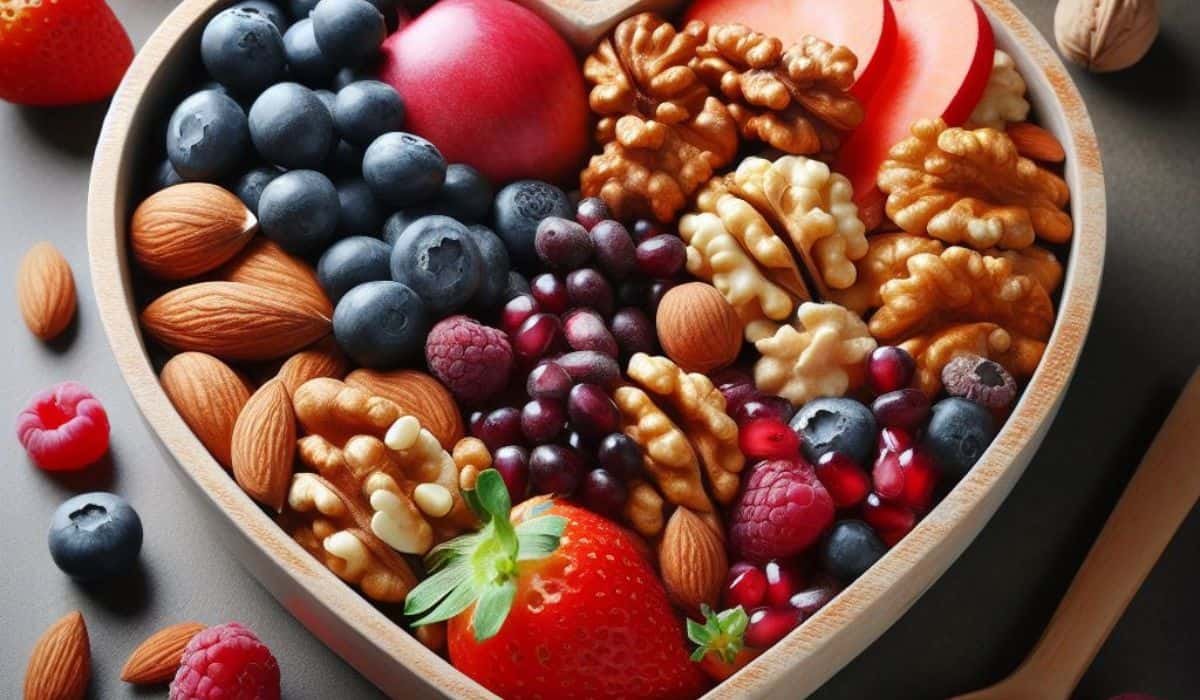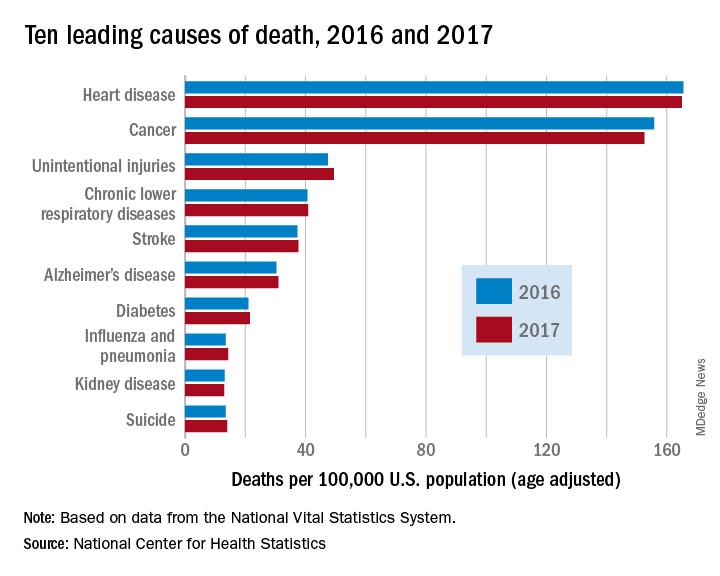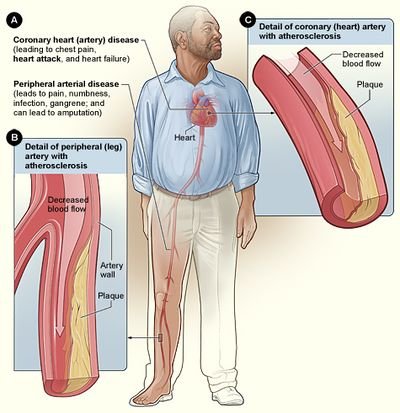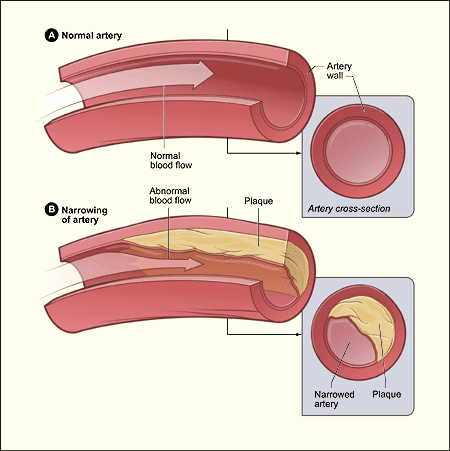10 Foods That Unclog Arteries Naturally And Prevent Heart Attack

The arteries are among the most important blood vessels in the human body. They carry oxygen and nutrients from the heart to other organs.
Their role is very important and they should be kept clean at all times. However, due to the unhealthy diet most of us eat nowadays and the declining levels of physical activity, our arteries are often clogged, leading to a heightened risk of cardiovascular diseases.
In this article we’re going to explore 10 foods that unclog arteries naturally and prevent heart attacks. Of course, to unclog your arteries, you don’t just need to add these foods to your diet, you need to remove others as well. Anyway, enough with the prologue, let’s straight jump in to the foods that unclog arteries naturally.
The leading cause of Death in America
Coronary artery disease is the primary cause of death in American adults. [1]
According to statistics from the CDC, it has held the top position for nearly a century, showing how dangerous clogged arteries can be. This disease is caused by a buildup of waxy plaque in the arteries.
Heart disease is just as deadly as cancer, with an increasing number of cases each year. It’s not just the USA – heart disease and stroke are the leading causes of death in many Western countries. The worst thing about it is that it can be prevented.

A 2016 study found that a healthy and active lifestyle is all we need to significantly cut down the risk of cardiovascular disease. Although genes were found to play a role in the risk of cardiovascular disease, unhealthy diet, and inactive lifestyle are far more dangerous.
The solution to heart disease has been under our nose. A healthy diet and regular exercise are all you need to unclog your arteries and avoid the risk of premature death.
Why do arteries clog?
Arteries are blood vessels that carry oxygen-rich blood throughout your body. When these arteries are healthy, their inner walls are smooth, allowing blood to flow through them easily. However, over time, a substance called plaque can build up on the inner walls of the arteries, leading to a condition known as atherosclerosis. [2]
Plaque is a sticky substance made up of several components that circulate in your blood, including calcium, fat, cholesterol, cellular waste, and fibrin (a material involved in blood clotting).
When there’s damage to the lining of the arterial wall, these substances start to accumulate at the site of damage, forming plaque. [3]
Several factors can cause damage to the arterial walls and contribute to plaque formation:
- High blood pressure
- High levels of “bad” cholesterol (low-density lipoprotein or LDL)
- Low levels of “good” cholesterol (high-density lipoprotein or HDL)
- Smoking
- Diabetes
- Obesity
- Inflammation associated with conditions like lupus or arthritis
- Age (above 60 years)
As more and more plaque builds up, the arteries begin to narrow and harden. This reduces the space for blood to flow through.
If the plaque buildup is significant, it can completely block the artery. This blockage can occur in any artery in the body. If it occurs in the arteries supplying blood to the heart or brain, it can lead to serious conditions like heart attacks or strokes.
The symptoms of clogged arteries depend on where the blockage occurs and which body part is affected. Some common symptoms can include fatigue, dizziness, shortness of breath, chest pain, lower back pain, cold hands or feet, and pain or numbness in your legs, hands, or feet.
10 Foods That Unclog Arteries Naturally
Now, here’s a list of 10 natural foods that can unclog your arteries and cut down the risk of cardiovascular diseases:
Broccoli
Despite its sometimes unpopular reputation, broccoli is a fantastic choice for arterial health. It’s rich in fiber and vitamin K, which play key roles in maintaining clean arteries.
Fiber helps prevent the buildup of plaque in your arteries, while vitamin K helps in blood clot prevention, ensuring that your arteries remain clear and your blood flows smoothly.
Avocado

Avocado, often praised for its creamy texture, contains an abundance of nutrients that can work wonders for your arteries.
Recent research indicates that consuming just one avocado a day can lower your LDL cholesterol levels significantly. [4]
Reduced LDL cholesterol translates to less plaque accumulation in your arteries, keeping them open and healthy.
Coffee
If you’re a coffee lover, here’s some good news. Regular, moderate coffee consumption has been linked to a lower risk of cardiovascular disease. [5]
This is attributed to the presence of antioxidants and chlorogenic acid in coffee, both of which play a role in preventing heart-related issues. Just one to two cups a day can help protect your heart.
Asparagus
Often overlooked, asparagus is a great choice for arterial health. It contains alpha-linolenic acid and folic acid, which help prevent blood vessel hardening and plaque buildup.
Moreover, it’s loaded with various heart-healthy vitamins, making it an excellent addition to your diet.
Citrus Fruits
The simple act of enjoying an orange, grapefruit, or lemon each day can do wonders for your arteries.
Citrus fruits are packed with vitamin C and other antioxidants that help keep your arteries clean and your heart in optimal shape. These antioxidants help reduce oxidative stress and inflammation, which are often linked to cardiovascular issues.
Spinach
Spinach is another green superfood that promotes arterial health. It helps reduce homocysteine levels in the blood, which is associated with atherosclerosis. [6]
By lowering homocysteine, spinach helps prevent the hardening and narrowing of your arteries, reducing the risk of deadly diseases.
Apples

The saying “an apple a day keeps the doctor away” holds true when it comes to your arteries. Apples are a great source of dietary fiber, which can help lower cholesterol levels and inhibit plaque buildup in your arteries. They also contain antioxidants and polyphenols that prevent the oxidation of LDL cholesterol, further contributing to healthier arteries.
Nuts
Nuts, particularly walnuts, are a heart-healthy snack. They’re rich in fiber, vitamin A, protein, and alpha-linolenic acid. This combination of nutrients helps maintain your cardiovascular health. The fiber and healthy fats in nuts support lower cholesterol levels and reduce the risk of arterial blockage.
Fatty Fish
Sardines, tuna, and mackerel are examples of fatty fish rich in omega-3 fatty acids. These healthy fats are well-known for their anti-inflammatory properties.
By reducing inflammation, they contribute to unclogging your arteries and lowering blood pressure. This makes them effective in preventing various cardiovascular diseases.
Watermelon
Surprisingly, watermelon can be beneficial for your arteries too. It contains compounds like L-citrulline and nitric oxide that help regulate blood pressure and keep your arteries from hardening. These compounds promote atherosclerosis prevention, making watermelon a refreshing and heart-healthy choice.
Add these foods into your diet and start working out (at least lightly), and you’ll surely improve your cardiovascular system.
Frequently Asked Questions
Final Take
So, there you have it. A list of 10 foods that can help you keep your arteries healthy and prevent heart attack. These foods are not only good for your heart, but also for your overall well-being.
They are rich in antioxidants, fiber, omega-3 fatty acids, and other nutrients that can lower your blood pressure, cholesterol, and inflammation.
By adding these foods to your diet, you can enjoy a delicious and balanced meal that will boost your cardiovascular health. Remember, prevention is better than cure, so eat well and stay well.
Read Next


